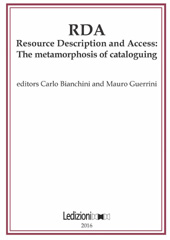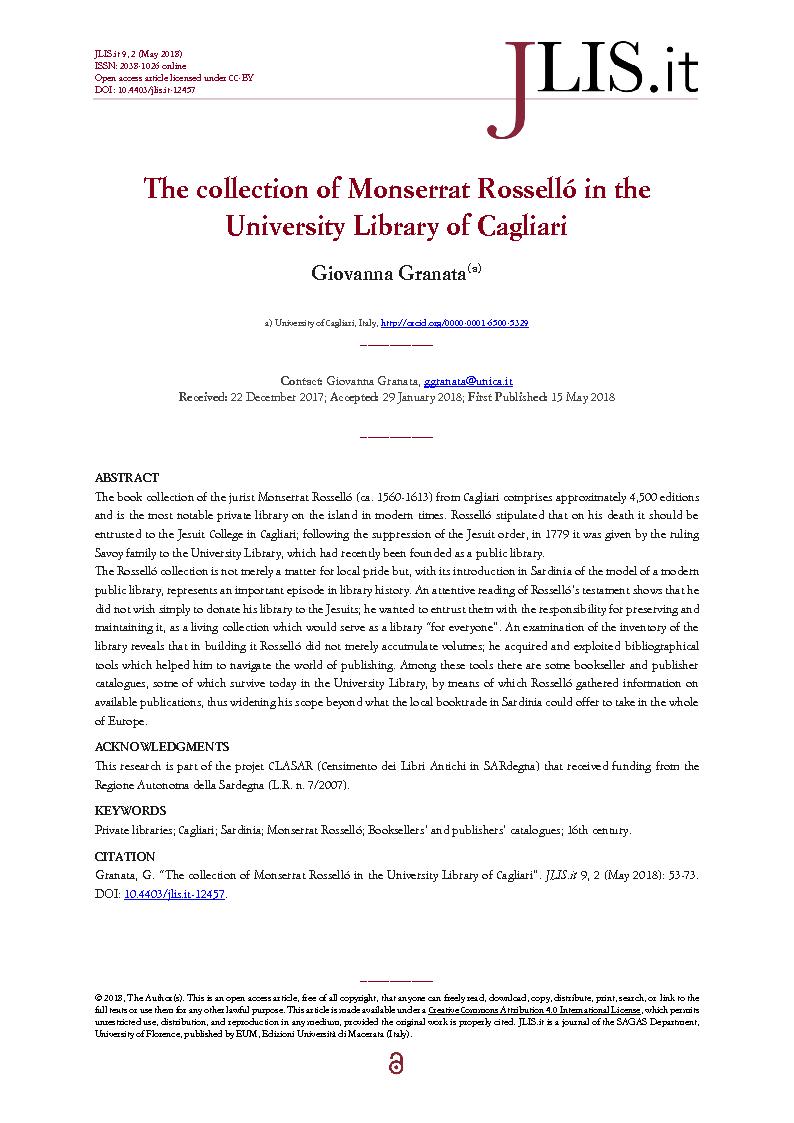The collection of Monserrat Rosselló in the University Library of Cagliari
P. 53-73
La collezione del giurista cagliaritano Monserrat Rosselló (ca. 1560-1613), ricca di circa 4500 edizioni, rappresenta la più ragguardevole biblioteca privata isolana dell'età moderna. Per volontà del possessore, alla sua morte essa è stata affidata al collegio gesuitico di Cagliari e, dopo la soppressione della Compagnia di Gesù, nel 1779 è stata ceduta dai Savoia alla Biblioteca universitaria, da poco fondata come biblioteca pubblica. La collezione Rosselló non costituisce solo un vanto locale, ma rappresenta un importante episodio di storia bibliotecaria con cui è stato introdotto in Sardegna il modello della biblioteca pubblica moderna. Dall'analisi del testamento si capisce che Rosselló non intendeva semplicemente donare la sua biblioteca ai Gesuiti, ma voleva affidare loro il peso di conservare e mantenere viva una biblioteca "per tutti".
L'esame dell'inventario della biblioteca chiarisce che nel costruirla Rosselló non si è limitato ad una logica di accumulo, ma si è dotato di strumenti bibliografici mediante i quali orientarsi nel mondo dei libri. Tra essi sono anche alcuni cataloghi di librai ed editori, in parte conservati ancora presso la Biblioteca Universitaria, attraverso i quali egli si è potuto informare sulla produzione libraria, superando le opportunità del mercato locale ed allargando lo sguardo dalla Sardegna all'Europa. [Testo dell'editore]
The book collection of the jurist Monserrat Rosselló (ca. 1560-1613) from Cagliari comprises approximately 4,500 editions and is the most notable private library on the island in modern times. Rosselló stipulated that on his death it should be entrusted to the Jesuit College in Cagliari; following the suppression of the Jesuit order, in 1779 it was given by the ruling Savoy family to the University Library, which had recently been founded as a public library. The Rosselló collection is not merely a matter for local pride but, with its introduction in Sardinia of the model of a modern public library, represents an important episode in library history. An attentive reading of Rosselló's testament shows that he did not wish simply to donate his library to the Jesuits; he wanted to entrust them with the responsibility for preserving and maintaining it, as a living collection which would serve as a library "for everyone".
An examination of the inventory of the library reveals that in building it Rosselló did not merely accumulate volumes; he acquired and exploited bibliographical tools which helped him to navigate the world of publishing. Among these tools there are some bookseller and publisher catalogues, some of which survive today in the University Library, by means of which Rosselló gathered information on available publications, thus widening his scope beyond what the local booktrade in Sardinia could offer to take in the whole of Europe. [Publisher's text]
-
Articles from the same issue (available individually)
-
Information
ISSN: 2038-1026
DISCIPLINES
KEYWORDS
- Private libraries; Cagliari; Sardinia; Monserrat Rosselló; Booksellers' and publishers' catalogues; 16th century



